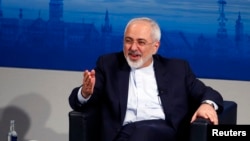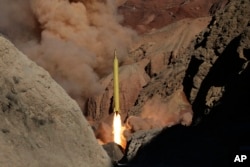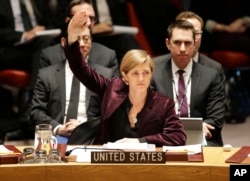Iranian Foreign Minister Mohammad Javad Zarif said Tuesday his country's missile tests last week did not violate the nuclear agreement Iran signed with a group of world powers last year.
Speaking during a visit to Australia, Zarif reiterated that Iran sees the missiles as a key measure of self defense and that they are not meant to deliver nuclear warheads.
"We do not design any missiles to carry things that we do not have," he said.
He also challenged "those who are complaining about Iran's missile program" to join Iran in declaring they will only use force in self defense.
His comments followed U.S. Ambassador to the U.N. Samantha Power saying Monday the launches were “dangerous, destabilizing and provocative” and “undermine the prospect for peace” in the region.
Washington says the launches violate language of a U.N. resolution adopted in July, which “calls upon” Iran not to “undertake any activity related to ballistic missiles designed to be capable of delivering nuclear weapons, including launches using such ballistic missile technology.”
"We are comfortable that we have a strong case," State Department spokesman John Kirby said. "These launches are clearly in defiance of that resolution. There is no question about it."
When asked if U.N. sanctions should be imposed against Iran, Russian Ambassador Vitaly Churkin categorically ruled that out, responding, “The clear and short answer is no.” Churkin told reporters that there was no “legal” violation of the Security Council resolution. “A call is different from a ban. Legally you cannot violate a call,” Churkin said.
“You can comply with a call or ignore a call, but you cannot violate a call. Some may say it’s a bad thing anyway, and I would not necessarily dispute that; the legal distinction is there,” he added.
“Russia seems to be lawyering its way to look for reasons not to act, rather than stepping up and being prepared to shoulder its collective responsibility,” Ambassador Power said.
She said the United States would “not give up” in the Security Council and would provide technical information that Iran had made public “showing that the technology they used is inherently capable of delivering nuclear weapons” and in defiance of the U.N. resolution. Power added that Washington could consider its own unilateral response.
British Ambassador Matthew Rycroft said Monday’s meeting was an “important first step” and that the council would discuss the range of options available to it.
One option would be to have the U.N. Secretary-General investigate the launch and report back to the council. But Ambassador Churkin said he did not think a special report is necessary. Under the U.N. resolution, the secretary-general reports twice a year to the council on the resolution’s implementation. The next report is not due until July.
Diplomats appeared to agree that last week’s missile launch did not violate terms of a nuclear deal agreed between the world powers and Tehran in July.
Meanwhile, Israel’s U.N. envoy told reporters his country wants a full investigation into the launches.
“If the Security Council does not act after last week’s missile test, it will give Iran a greenlight to continue with its nuclear missile tests,” Israeli envoy Danny Danon said.






